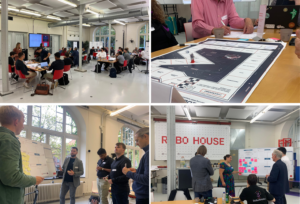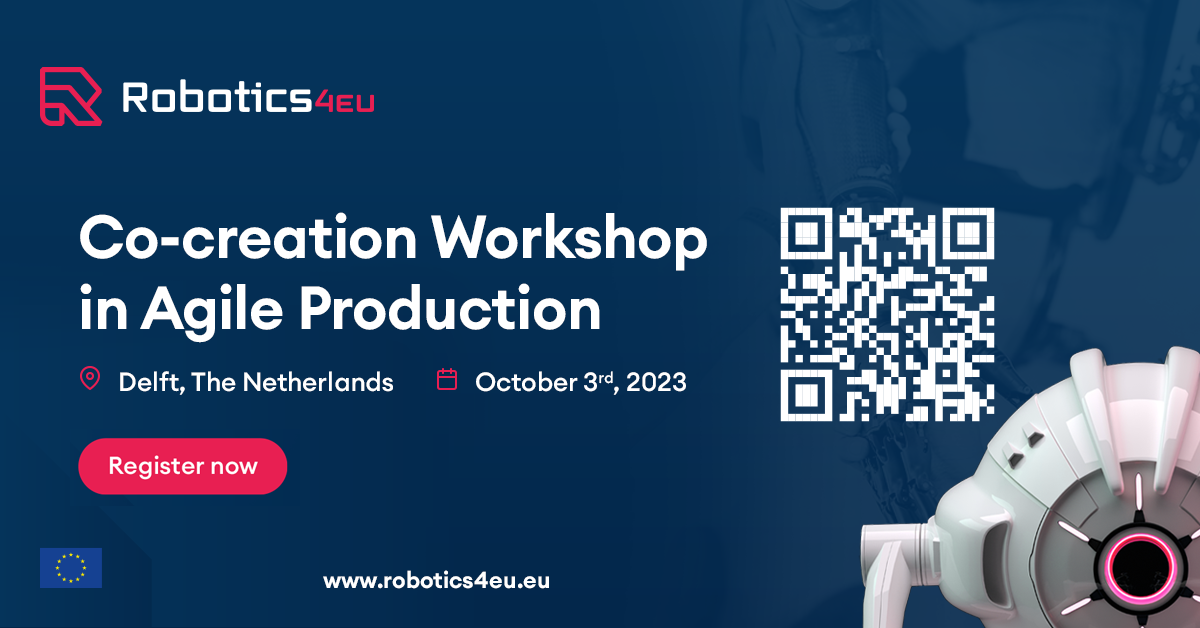On October 3rd, the Robotics4EU project hosted its third workshop from the series of co-creation workshops focusing on bringing together robot developers with end-users and stakeholders to discuss the societal aspects of their robot development. This time the focus was on Robotics within Agile Production.
A Day of Insightful Sessions:
The workshop was comprised of two sessions, with the morning focusing on the co-creation discussion game exploring various robotic solutions in agile production. The afternoon session involved testing the latest online version of the RoboCompass developed by the Robotics4EU.
At the heart of the workshop was a custom discussion game developed by The Danish Board of Technology. This tool aimed to guide group discussions, enabling participants to evaluate societal acceptance aspects of the presented robotic solutions. It facilitated conversations on important societal topics, including Data, Environment, Human-experience, Legal, and Socio-economic and Engagement. The discussions were dynamic, covering a broad spectrum of topics, opportunities, and challenges. The high level of enthusiasm and engagement from all participants contributed significantly to the workshop.
RoboHouse – A Playground for Innovation:
The workshop took place at RoboHouse in Delft, Netherlands, and engaged 26 participants in fruitful and constructive discussions. RoboHouse, located on the TU Delft Campus, served as a fitting venue for hands-on learning and experimentation, aligning with the workshop’s focus on creating a co-creative environment for exploration and open discussions on the future development of robots in agile production.
The workshop utilized real-world examples of agile production robots as case studies. It sought to engage both developers, end-users and stakeholders in insightful conversations, placing special emphasis on promoting wider acceptance within society and enhancing the seamless integration of the specific robots presented at the workshop.
Throughout the workshop, participants were organised into five groups, each assigned to focus their discussions on a specific robot. To facilitate their discussions the participants used the discussion game designed by the Robotics4EU project.
The different robots participating were:
- DARKO Project: A driving robot for efficient object handling in collaborative work environments.
- Digiotouch: A robot streamlining arc-welding tasks in agile production settings.
- Industrial Robotics: Focused on making robotics accessible to smaller-scale factories and individuals lacking programming expertise.
- SINTEF: Offering a robot capable of loading and unloading dynamic objects from hanging conveyors without facility modifications.
- Senseglove: Introducing a wearable glove with force feedback technology applicable to various agile production scenarios.

Key Outcomes and Themes:
The workshop discussions brought forth key themes regarding non-technological aspects of robotics in agile production:
- Sustainable material use: Exploring repurposing plastic and materials for immediate and future sustainability and responsible technological development.
- Minimizing waste in application areas and short-term and long-term environmental effects: Addressing waste reduction within domains, particularly through increased automation, for enhanced efficiency, cost-effectiveness, and environmentally responsible practices. Recognising the challenge of limited information on the environmental impact of robots versus human workers.
- The need for legal regulation, standardisation, and authorisation: Emphasising the need for enhanced legal frameworks to navigate complexities in robot-human interactions, ensuring responsible and accountable deployment. Establishing standards for effective and safe implementation in diverse and dynamic environments.
- Incorporate legal requirements and standardisation elements into the development process: Recognising the impossibility of achieving 100% safety in initial robotic design, emphasising the critical importance of addressing legal requirements and standardisation early in development for safer and more efficient solutions.
- Accountability and liability for robots in agile production: Addressing the complexity of determining responsibility in the case of errors or harm caused by robots.
- Critical assessment of robotics in agile production: Involving critical self-assessment and hypothetical scenarios to reflect on the responsible development and deployment of robotic technologies.
- Evolution of technology and AI capabilities: Focusing on challenges in data collection, such as barriers to obtaining data contributions, ethical considerations in determining areas for automation, and the strategic implementation of automation for maximizing value creation.
- Social inequality and accessibility: Discussing the potential impact of increased automation on social inequality, upskilling of workers, and creating solutions widely available to various user types.
- Data collection and privacy: Addressing data-related issues, including extensive data collection capabilities of robotic solutions, the utilisation of cameras, motion capture, and the need for a robust, encrypted cloud infrastructure to ensure secure storage and utilisation.
- Ongoing and transparent engagement of relevant stakeholders: Emphasising the development of validated solutions with stakeholders, actively engaging end-users, and ensuring transparency from the early stages of the process.
THANK YOU:
The co-creation workshop on Agile Production Robotics facilitated great collaborative efforts to address the challenges barriers and great opportunities for future development. We want to thank all the participants who took part! The insights gained will contribute to the ongoing development of RoboCompass and inform the broader Robotics4EU initiative.
The discussion game will soon be available as a free resource on the Robotics4eu website, so make sure to check back once it is available.










